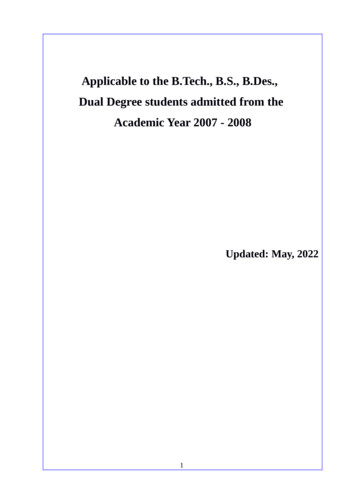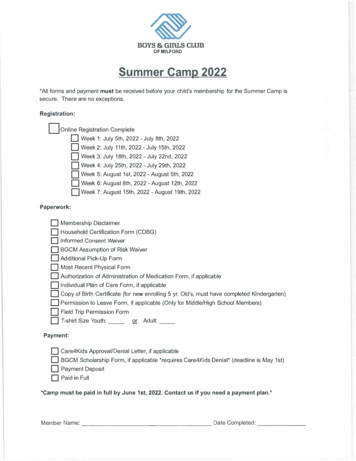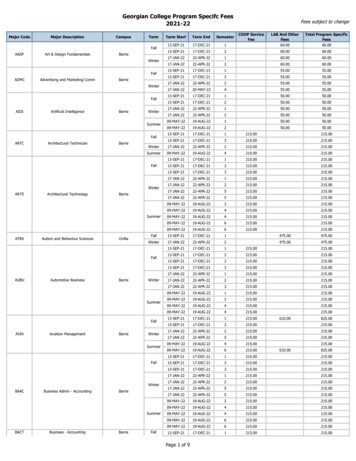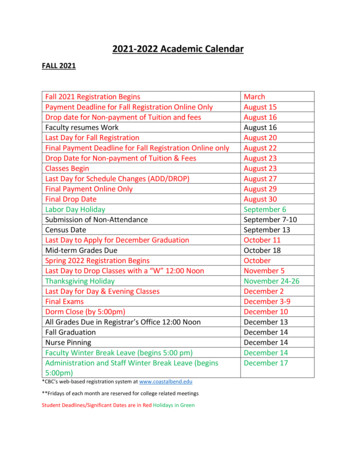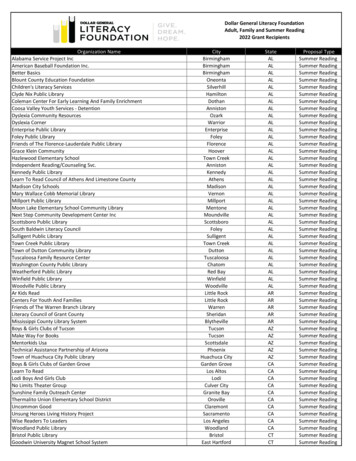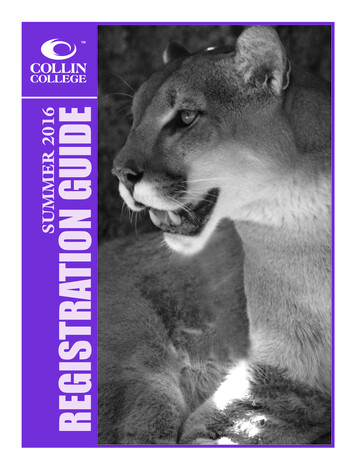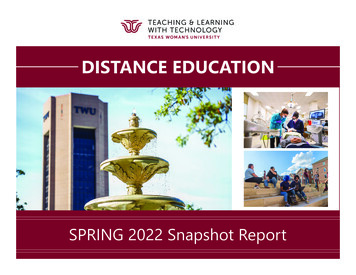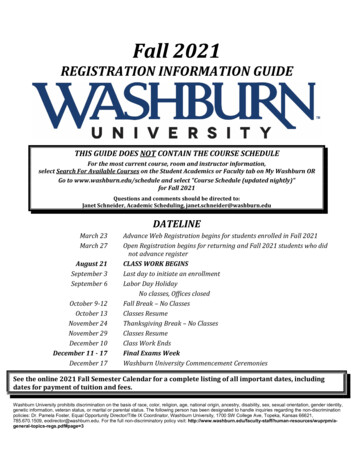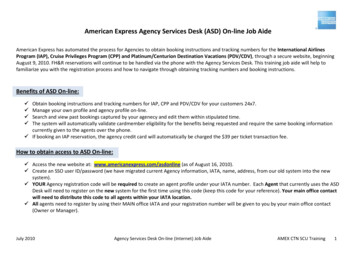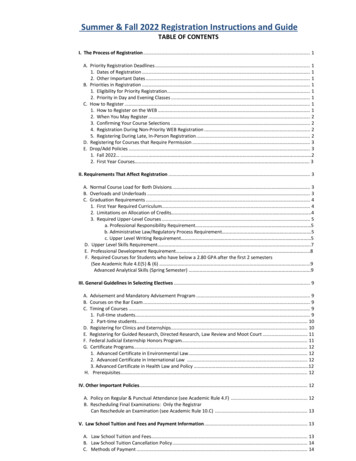
Transcription
Summer & Fall 2022 Registration Instructions and GuideTABLE OF CONTENTSI. The Process of Registration . 1A. Priority Registration Deadlines . 11. Dates of Registration . 12. Other Important Dates . 1B. Priorities in Registration . 11. Eligibility for Priority Registration . 12. Priority in Day and Evening Classes . 1C. How to Register . 11. How to Register on the WEB . 12. When You May Register . 23. Confirming Your Course Selections . 24. Registration During Non-Priority WEB Registration . 25. Registering During Late, In-Person Registration . 2D. Registering for Courses that Require Permission . 3E. Drop/Add Policies . 31. Fall 2022 . 22. First Year Courses . 3II. Requirements That Affect Registration . 3A. Normal Course Load for Both Divisions . 3B. Overloads and Underloads . 3C. Graduation Requirements . 41. First Year Required Curriculum. 42. Limitations on Allocation of Credits .43. Required Upper-Level Courses . 5a. Professional Responsibility Requirement 5b. Administrative Law/Regulatory Process Requirement . .5c. Upper Level Writing Requirement 5D. Upper Level Skills Requirement . . .7E. Professional Development Requirement . .8F. Required Courses for Students who have below a 2.80 GPA after the first 2 semesters(See Academic Rule 4.E(5) & (6) . .9Advanced Analytical Skills (Spring Semester) . . .9III. General Guidelines in Selecting Electives . 9A. Advisement and Mandatory Advisement Program . 9B. Courses on the Bar Exam . 9C. Timing of Courses . 91. Full-time students. 92. Part-time students . 10D. Registering for Clinics and Externships . 10E. Registering for Guided Research, Directed Research, Law Review and Moot Court . 11F. Federal Judicial Externship Honors Program. 11G. Certificate Programs . 121. Advanced Certificate in Environmental Law . 122. Advanced Certificate in International Law . 123. Advanced Certificate in Health Law and Policy .12H. Prerequisites . 12IV. Other Important Policies. 12A. Policy on Regular & Punctual Attendance (see Academic Rule 4.F) . 12B. Rescheduling Final Examinations: Only the RegistrarCan Reschedule an Examination (see Academic Rule 10.C) . 13V. Law School Tuition and Fees and Payment Information . 13A. Law School Tuition and Fees. 13B. Law School Tuition Cancellation Policy . 14C. Methods of Payment . 14
D. Billing Information . 15E. Payment Options . . 16F. International Students . .16G. Full Payment . 16H. Deferral of Payment Utilizing Financial Aid . 16I. Registration Void Due to Non-Payment . 17J. Delinquency of Outstanding Balance . 17K. Student Refunds . 17
I. THE PROCESS OF REGISTRATIONA. Priority Registration Deadlines1.Dates of RegistrationSummer and Fall 2022 –Priority Period WEB Registration:April 4 - 7, 2022Summer - Last Day to Register or Drop/Addon Web:May 22, 2022Summer - Late In-Person Registration andDrop/Add Week:May 23 – May 27, 2022Fall - Last Day to Register or Drop/Add onWeb:August 26, 2022Fall - Late In-Person Registration andDrop/Add Week:2.August 27 – September 3, 2022Other Important DatesSummer 2022 Tuition Payment DateMonday, May 23, 2022Fall 2022 Tuition Payment DateSaturday, August 27, 2022Students with Bursar, Health Office or Undergraduate Transcript HOLDS will not beallowed to register during priority registration week.ALL HOLDS MUST BE CLEARED BY APRIL 1, 2022B. Priorities in Registration1. Eligibility for Priority RegistrationAll matriculated Pace Law students who have a clear balance with no holds from the previous semester are eligiblefor priority registration.2. Priority in Day and Evening ClassesAll students may register for all courses beginning on April 4, 2022 in accordance with the chart on the next page.Students in the LLM and SJD program may begin registering on Thursday, April 7, 2022.C. How to Register1. How to Register on the WEBTo access the Registration system, go to https://portal5.pace.edu and log in to MyPace portal by entering youruser name and PIN. Once logged on to the portal, click the student tab, then click “Registration, Grades andTuition Schedule,” and then click “Register, Add or Drop Classes.”If you have questions about logging on to MyPace or using the registration system, please elp/account-services#s-portal1
2. When You May RegisterPlease refer to the Registration Chart below for your date to register. You may not register before your assigneddate, but you may register or drop/add any time thereafter until the last day of WEB registration. Please note that,even after priority registration, a course is subject to cancellation for low enrollment.Priority Registration Chart – Summer & Fall 2022Registering for:Third Year FT and Fourth Year PTThird year PTSecond Year FT, Second Year PTand Jan Admit StudentsLLM and SJD StudentsDATE /TIME WEB PRIORITYREGISTRATION BEGINSMonday, April 4th8:00 a.m.Tuesday, April 5th8:00 a.m.Wednesday, April 6th8:00 a.m.Thursday, April 7th8:00 a.m.3. Confirming Your Course SelectionsAfter completing your registration, make sure you confirm your course selection by printing the screen on yourcomputer.4. Registration During Non-Priority WEB RegistrationAny student may register during this time. Keep in mind, however, that some courses may be closed or cancelled.5. Registering During Late, In-Person RegistrationStudents who do not register on the WEB during “priority” or “non-priority” weeks must register in person at theRegistrar’s Office during “Late, In-Person Registration.” A late fee of 200.00 will be assessed at the time of lateregistration.Under University policies, a student who has not registered by the end of the late registration period will not bepermitted to register for the semester. The Law School is not authorized to waive or vary this University policyon late registrations.D. Registering for Courses that Require PermissionIf you would like to register for a course that requires permission (e.g., clinics, externships, Guided Research, DirectedResearch, law review, moot court, Federal Judicial Honors Program), you must register for that course in person at theRegistrar’s Office, or by sending an email to the Registrar once you have been granted permission.2
E. Drop/Add Policies (See Academic Rule 7.D)1. Summer and Fall 2022Students may drop and add courses online from the first day of their appointed WEB priority registrationthrough May 23rd for Summer courses and August 27th for Fall courses.Summer- After May 23, 2022, when the in-person drop/add period ends, a student can only drop/add coursesif the student completes a drop/add form from the Registrar’s Office. Students must have that form signed bythe professor and the Academic Dean. Students who drop a class after the fourth week of classes (beginningon Monday, June 20, 2022) will receive a “W” on their transcript. No student may withdraw from a class afterthe last day of classes.Fall – After September 3, 2022, when the in-person drop/add period ends, a student can only drop/addcourses if the student completes a drop/add form from the Registrar’s Office. Students must have that formsigned by the professor and the Academic Dean. Students who drop a class after the fourth week of classes(beginning on Saturday, September 24, 2022) will receive a “W” on their transcript. No student maywithdraw from a class after the last day of classes.2. First Year CoursesFirst year students MAY NOT withdraw from a first year course and may not transfer from a section to whichthey are assigned. The Registrar’s Office will check all registrations to ensure that students are enrolled intheir assigned sections. Full-time students must complete all first year requirements before taking upperclass courses. Part-time and transfer students must complete all required courses for full-time first yearstudents as quickly as possible.II. REQUIREMENTS THAT AFFECT REGISTRATIONA. Normal Course Load for Both Divisions (See Academic Rule 7.B)The normal course load is 13 to 16 credit hours per semester for full-time students and 9 to 12 credit hours persemester for part-time students.B. Overloads and Underloads (See Academic Rule 7.C)Although a normal full-time course load is 13-16 credit hours, full-time students may register for10-12 credits as an underload and may register for 17 credits as an overload, with the permission of the AcademicDean.Although a normal part-time course load is 9-12 credit hours, part-time students may register for 8 credits as anunderload or 13 credits as an overload, with the permission of the Academic Dean.Overload permission will normally be granted only if the student has a strong law school academic record. Underloadpermission will normally be granted only if the student, through summer school attendance, is significantly ahead of hisor her class in credits or if, in the case of final semester part-time students, only 8 credits are needed to graduate.Students in the full-time program may not carry fewer than 10 credit hours in a semester and part-time studentsmay not carry fewer than 8 credit hours in a semester.During the summer semesters a fulltime student may take no more than 8 credits and a parttime student may take nomore than 6 credits.3
C. Graduation Requirements (See Academic Rule 4.A)To graduate, students must earn 88 Academic credits, 6 Professional Development credits, a minimum GPA of 2.30 andmust pass all required courses. More information can be found on the Graduation Requirements Worksheet availableonline at duation-information or in the Registrar’s Office.1. First Year Required Curriculum --Entered Fall 2019 or laterFull-Time:Fall Semester (15)Civil Procedure (4)Criminal Law (4)Torts (4)Skills I( 3)Part-TimeFirst Semester (11 credits)Skills I (3)Civil Procedure (4)Torts (4)Spring Semester (15)Property (4)Contracts (4)Constitutional Law (4)Skills II (3)Second Semester (11 credits)Skills II (3)Property (4)Contracts (4)Third or Fourth Semester (4 credits)Criminal Law (4)Third or Fourth Semester (4 credits)Constitutional Law (4)First year students may not withdraw from any course or switch sections in any course.2. Limitations on Allocation of Credits: Under the Rules of the New York Court of Appeals and the ABA, of the 88 Academic creditsrequired to graduate, no more than an aggregate 24 of those 88 Academic credits may fall into the following categories:1. Experiential: Credits designated as “Field Placement” in externships, practicums, and continued clinical work, notincluding credits earned from any seminar accompanying externships;2. Non-law graduate school: A maximum of 12 credits taken at a non-law graduate school after matriculation in law school,either as a joint degree candidate or otherwise;3. Co-curricular: A maximum of 4 credits designated as “Co-curricular” in non-classroom based, co-curricular activities suchas Moot Court or other Student Competition teams, and Law Review; and4. Guided Research/ Directed Research: A maximum of 4 credits of Guided Research and Directed Research.Students may not receive credit for taking the same externship twice.Distance Education: Under the Rules of the New York Court of Appeals and the ABA, of the 88 Academic credits required for JDstudents to graduate, no more than 15 of those credits may be credits from Distance Education courses. Distance courses aredefined as those courses “in which more than one-third of the course instruction is characterized by the separation, in time or place,or both, between instructor and student, and the instruction involves the use of technology to support regular and substantiveinteraction among students and between students and the faculty member, either synchronously or asynchronously.” Classes thatqualify as Distance Education courses under that definition shall be designated as “Distance” by the Registrar’s Office.All courses completed in the spring 2020, summer 2020, fall 2020, spring 2021, summer 2021, fall 2021 and Spring 2022 semestersdo NOT count towards your distance education credit limits.Note: JDs with less than 28 completed credits are not allowed to register for distance courses.L.L.M. students seeking to sit for the N. Y. Bar Exam may not count any distance credits towards the 24required credits.4
3. Required Upper-Level Courses (See Academic Rule 4.E(1))a. Professional Responsibility: All full-time students are required to take Professional Responsibility during their secondyear of law school. All part-time students are required to take Professional Responsibility during their second or third yearof law school. To defer taking the course until the last year of law school, a student must receive permission from theAcademic Dean on a form available from the Registrar’s office or website.b. Administrative Law/Regulatory Process Requirement: All students who entered in the Fall 2015 semester or thereaftermust successfully complete a course offering in-depth exposure to administrative law, legislation, and/or the regulatoryprocess, either by way of general principles or as applied in a specific context. Approved courses fulfilling this requirement(to be revised from time to time by the Curriculum Committee) are:Administrative LawEnvironmental Skills and Practice/Clean Water ActEnvironmental Law SurveyFederal Income Taxation IHealth Law in AmericaImmigration Justice ClinicLabor Law (3 credit version)Legislative and Regulatory ProcessNatural Resources LawSecurities Regulationc. Upper-Level Writing Requirement: All students must complete a writing project under the supervision of a Professor. It isthe student's responsibility to inform the Professor at the beginning of the semester that the student is taking the course tosatisfy the upper level writing requirement. The Professor must certify to the Registrar at the end of the semester that all ofthe elements of the requirement have been met. Only faculty-supervised writing may satisfy the requirement.Participation in Moot Court competitions or contests does not satisfy the requirement. The required permission forms areavailable from the Registrar's office or website.i) Courses that Satisfy the Requirement: Any course that is certified by the Academic Dean as satisfying therequirement may be taken to satisfy it. A list of courses that have been certified will be included in the Registrationmaterials each semester. This list includes:1) Seminars taught by full time faculty members2) The Federal Judicial Honors Program, Fall Semester Faculty Guided Research Only3) Advanced Appellate Advocacy4) Guided Research or Directed Research (2 credits) with a full-time faculty member (only students withadvanced permission of the Professor and the Academic Dean and a cumulative GPA of 3.0 or higher orwith 3.33 or higher in the specialty area of their proposed project are eligible for Guided Research orDirected Research)5) Pre-trial Civil Litigation Simulation6) Any other upper-level course, provided that a full-time or adjunct professor teaching the course or theclinic and the Academic Dean agree that the student may use the course in question to satisfy therequirement.ii) Law Review Notes: Students enrolled in any of the three law reviews ( Pace Law Review, Pace EnvironmentalLaw Review and Pace International Law review) may satisfy the requirement by writing their notes or comments,provided, however, that a full-time professor assigned by the Academic Dean reviews and certifies that eachstudent note or comment meets the substantive requirements of the upper level writing requirement. Please besure to fill out a ULWR permission form before September 30th for Fall and before February 28th for Spring so thatthe Academic Dean can assign you a professor to work with.5
iii) Requirements of the Writing Project: The written project must be in the form of a scholarly article, a legalmemorandum, or a trial or appellate brief. The written product must be well-organized and clearly written, andordinarily it must be at least 25 double-spaced pages long, exclusive of footnotes. It must demonstrate anappropriate level of legal research and analysis, and contain ample and correct citations to legal authority.Journals, diaries, and other writings that do not reflect research and analysis do not meet this requirement. Exceptfor the suggestions of editors and faculty, the written product should reflect the individual work of the student.1) To satisfy the upper-level writing requirement, a course must contain the following elements:i. submission of a draft;ii. feedback on the draft in any combination of the following forms: oral, written checklists, audiotapes;andiii. submission of a final product.2) To satisfy the upper-level writing requirement, a course should contain the following elements:i. a required writing text;ii. research agenda and logs (not necessarily graded);iii. an outline (not necessarily graded);iv. a self-critique or peer-critique experience; andv. either (1) a minimum of two hours of class time devoted to the teaching of writing, or (2) individualstudent-teacher conferences, with feedback on further drafts at the option of the professor.Fall 2022 list of approved ULWR courses taught by full time faculty:Animal LawElection Law SeminarElder LawHistoric PreservationJuvenile JusticeSocial Media LawProf. CassutoPres. KrislovProf. FlintProf. GreenProf. SobieProf TenzerThe following courses, clinics and externships offered in Fall 2022 may satisfy the upper level writing requirement as statedin §4.E(2)(a)(5) of the Academic Rules assuming that the Professor and the Academic Dean agree at the beginning of thesemester that the student may use the course to satisfy the upper-level writing requirement:Clinic - Environmental LitigationClinic – Real Fi Investor RightsClinic- Food & BeverageProfessors Coplan/OmmenAdj. Professor GermaineAdj. Professor BrownIt is the student’s responsibility to obtain the permission of the Professor and Academic Dean (at the beginning of thesemester), and to submit the completed permission form to the Registrar’s Office during the first three weeks of classes. Itis also the student’s responsibility to make sure the “Faculty Authorization for Fulfillment of ULWR” form has beensubmitted and entered on the student’s transcript.d) Required Research and Citation Workshop: As part of the Upper Level Writing Requirement, all students mustcomplete a Research and Citation Workshop with the Law School’s Reference Librarians some time during thesecond, third, or fourth year of Law School. Alternatively, completion of the Advanced Legal Research course willsatisfy this requirement. In addition, some upper level seminars used to fulfill the Upper Level WritingRequirement that also incorporate a Research and Citation Workshop will satisfy the requirement. All studentsmust submit a Certificate of Completion, signed by a Reference Librarian, in order to complete successfully thisresearch and citation component of the Upper Level Writing Requirement.6
D. Upper Level Skills Requirement: Students must successfully complete the two components of the ULSR: 1.a minimum of6 credits of coursework in courses approved by the Faculty Curriculum Committee as upper level skills courses and 2. TheNY State Skills Competency Requirement for admission to the NY Bar as part of fulfilling the 6 credit minimum.1.Approved upper level skills courses are:Direct Representation ClinicsAmelia Gould Representation in Mediation ClinicBarbara C. Salken Criminal Justice ClinicEqual Justice America Disability Rights ClinicEnvironmental Litigation ClinicFood & Beverage ClinicImmigration Justice ClinicReal Fi Investor Rights ClinicSemester-in-PracticePro Bono Scholars ProgramExternshipsCorporate Law ExternshipCriminal Justice (Prosecutorial) ExternshipEnvironmental Law Externship (NY and DC)Family Court ExternshipFederal Judicial Honors Program (Spring Semester Chambers Placement)Legal Services ExternshipMediation PracticumPro Bono Scholars ProgramProsecution Honors ExternshipReal Estate ExternshipSemester-in-PracticeSocial Justice Advocacy ExternshipSimulationsAdvanced Appellate AdvocacyAdvanced Legal ResearchAdvanced Real PropertyAdvanced Trial AdvocacyCommercial Real Estate Transactions & SkillsDrafting Legal DocumentsEnvironmental Commercial TransactionsEnvironmental Dispute ResolutionEnvironmental SkillsFederal Criminal Pre-Trial SimulationHealthcare Lawyering SkillsIntellectual Property Agreements and LicensingLaw Practice ManagementLawyeringMatrimonial PracticeMediationNegotiationsPatent Practice and ProcedurePre-trial Civil Litigation Simulation (PCLS)All Skills WorkshopsTrial Advocacy7
2.Second, students entering the Law School in the Fall 2016 semester or thereafter, in connection with the New YorkState Skills Competency Requirement for admission to the NY Bar, must include at least ONE of the following in theircourse(s) satisfying the ULSR:1.2.3.The Pro Bono Scholars ProgramThe Semester-in-Practice Program (Track I, II, or III)Any clinic (Environmental Litigation; Disability Rights; Food & Beverage; Immigration Justice; Investor Rights; CriminalJustice; or Representation in Mediation)4. One of the following externships:a. Corporate Law Externshipb. Criminal Justice (Prosecutorial) Externshipc. Environmental Law Externship (NY only)d. Family Court Externshipe. Federal Judicial Honors Program (Spring Semester Chambers Placement)f. Legal Services Externshipg. Mediation Practicumh. Prosecution Honors Externshipi. Real Estate Externshipj. Social Justice Advocacy Externship5. One of the following Advanced Certificates or Concentrations:a. Advanced Environmental Certificate.b. Real Estate Practice Concentrationc. Criminal Practice Concentrationd. Litigation and Dispute Resolution Concentration[Concentrations only for students entering before Fall 2020]6. Lawyering CourseContact the Registrar or Academic Dean if you have any questions.Students may not satisfy both the Upper Level Skills requirement and the Upper Level Writing requirement with thesame course except that for a 2-semester clinic, a student may use the Fall semester of the clinic to satisfy onerequirement and the Spring semester to satisfy the other requirement. For purposes of this rule, the seminar componentof a clinic or externship is considered the same course as such clinic or externship, even if the seminar component bearsa separate course number.E. Professional Development Requirement: All students entering in the Fall 2015 semester or thereafter are required tofulfill a Professional Development Requirement in order to graduate. Students will satisfy the requirement by:a) Meeting in person with a Center for Career and Professional Development (“CCPD”) counselor by December 1st [or June1st for Spring Admits] of their first year of Law School;b) Participating in at least one counseling session with a CCPD counselor in their final year of law school;c) Earning six (6) professional development (“PD”) credits, in addition to their 88 academic credits, before graduating fromlaw school; andd) Completing the post-graduation employment form before graduation, as requested by the CCPD.Examples of program attendance at any one of which will earn students one (1) PD credit, can be found rofessional-development-program .8
Reminders:All law students seeking admission to the New York State (NYS) Bar after graduation must perform 50 hours of qualifyingpro bono work. Like all components of the NYS Bar application, completion and certification of these pro bono hours isyour responsibility. The Public Interest Law Center (PILC) is eager to help you understand the 50-hour requirement so thatyou can plan ahead and easily comply. The 50-hour requirement and accompanying information from the NYS UnifiedCourt System is on its website. After reviewing the website, please email the PILC at publicinterest@law.pace.edu with anyspecific questions and continue to watch for email announcements from PILC.All students must establish that they have acquired the skills and are familiar with the professional values necessary tocompetently practice law. See https://www.nybarexam.org/Skills/skills.htm. JD students entering in the Fall 2016semester or thereafter who complete the ULSR (see page 11) will qualify for Pathway 1 of the five possible Pathways formeeting this requirement. With the permission of the Academic
Please refer to the Registration Chart below for your date to register. You may not register before your assigned date, but you may register or drop/add any time thereafter until thelast day of WEB registration. Please note that, even after priority registration, a course is subject to cancellation for low enrollment.
